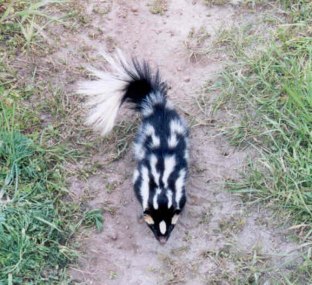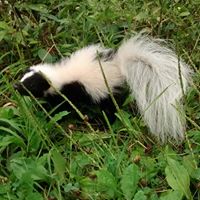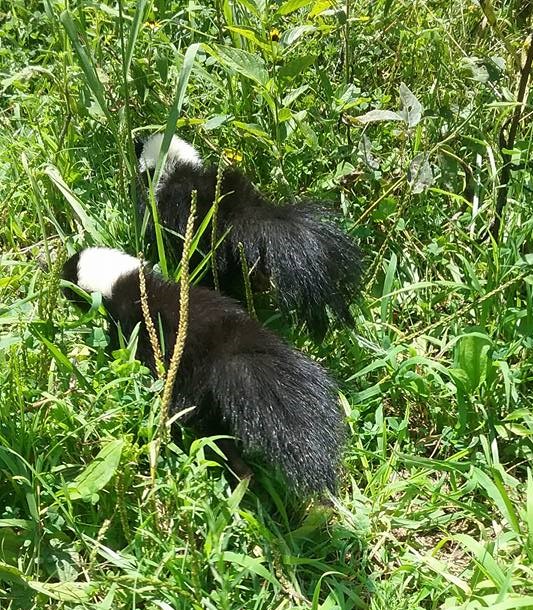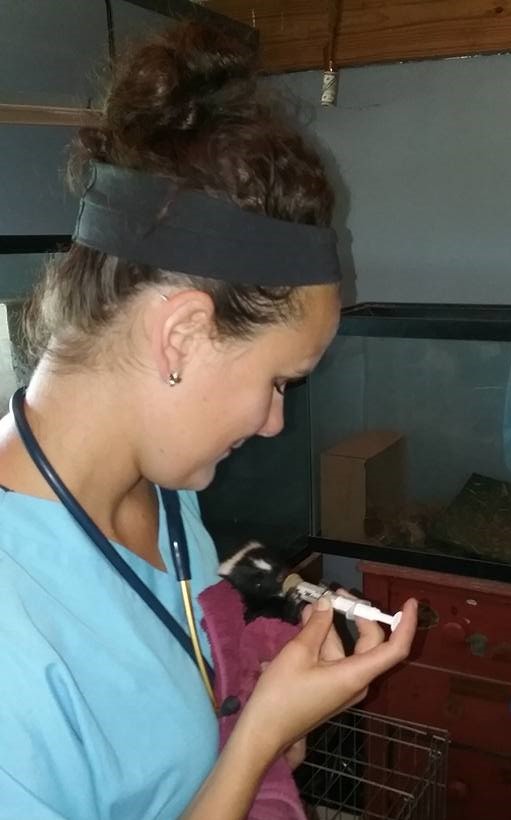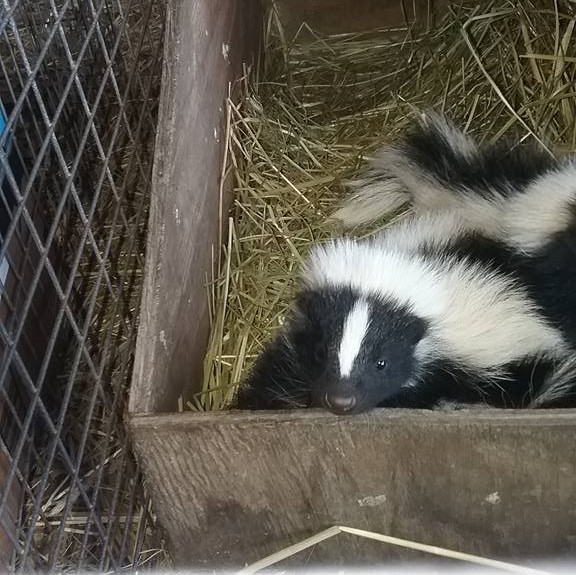Updated May 25, 2022
Skunks definitely have a bad rap. For anyone whose dog has come home smelling of rotten eggs, they can also cause an inconvenience! Skunks, however, do the environment a lot of good.
Kentucky Skunks
Skunks are a common mammal in Kentucky and live throughout the state. We sometimes hear skunks referred to as polecats.
In Kentucky we have two varieties of skunks; the striped skunk and the spotted skunk.
The striped skunk is the “classic” skunk and is seen all over the state in both rural and urban areas.
The spotted skunk is not as common and is considered to be an “at risk” species. The Kentucky National Land Trust is conducting studies to monitor their populations in Eastern Kentucky.
Skunks are related to weasels, minks, and otters. The markings on skunks follow a pattern but are unique to that skunk. Skunks may be predominantly black or mostly white.
The word ( squunck) skunk comes from the Abenaki Native American language meaning ‘to urinate’. The word skunk has had many bad connotations. In the 1600’s the skunk was a symbol of sin and today we use the term to describe a “bad deal”.
Spotted Skunks are not as common in Kentucky
Where Do Skunks Live in Kentucky?
Striped skunks live throughout the state of Kentucky. They are very adaptable and live in a wide variety of ecosystems. They prefer open meadows and often live near the forest edge.
However, we find skunks living in suburban neighborhoods as well as rural ones.
Skunks live in underground dens. These may be under a tree, along a fence row, or even under your porch. Skunks have long claws and are good diggers but they will also inhabit abandoned dens of other animals.
What Do Skunks Eat?
Skunks are omnivores. Omnivores eat a variety of plant and animal foods.
A skunk’s diet consists of small mammals, insects, and plants. Many pest animals such as mice, shrews, moles, cutworms, cabbage loopers, and grubs are commonly eaten.
They will also forage for hornets, wasps, honey bees, and yellow jackets. In fact, a skunk will raid a beehive!
Skunks eat a variety of plant materials as well. Berries, roots, and nuts are among their favorites.
Are Skunks Nocturnal?
Skunks are predominately nocturnal and often forage at dawn and dusk. However, they do sometimes come out during the day.
If you see a skunk on a warm spring day, she is not ill, she is most likely a mom finding nourishment for her babies.
Do Skunks Hibernate?
In winter, skunks will often retire to their dens and sleep. During this time they rely on fat reserves for nourishment. However, skunks do not hibernate in the true sense of the word. Read my blog NIGHTY NIGHT, SLEEP TIGHT! HIBERNATION, BRUMATION AND TORPOR EXPLAINED to learn more about hibernation.
For most of the year, skunks are solitary. But in winter they will often get together in dens for warmth.
Skunks are rather slow-moving animals and like to stick close to home. The females especially, typically have a small range of a mile to a mile and a half from their den.
Pepe Le Pew and Reproduction
We all love the Warner Brothers character Pepe Le Pew from our childhood. What a romantic, if not a tad misguided!
In real life, skunks are mating from mid-February through mid-March. So drive slowly and watch out for them on the road. Skunks are polygamous and males may mate with several females.
During mating season a male may travel up to four miles to find a mate.
The gestation period for skunks is about 66 days and the young are born in a burrow in the ground called a den. Skunk kits are born with their stripes and are blind and deaf. They are totally dependent on mom. They open their eyes at three weeks.
Skunks are excellent mothers and have a strong maternal bond. They will return to a disrupted nest to look for and save kits. A mother skunk raises her litter for four months before the kits move on.
Subscribe to Us On YouTube
Skunk Trivia:
Fossil remains to 12 million years ago
Very smart and can solve puzzles
Very clean
After a skunk sprays, it takes 2-10 days to “refill”
A skunk can spray as young as two weeks old
The skunk can shoot spray up to 20 feet
Normally there are 5-9 kits in a litter but as many as 18 may be born.
What Is That Smell?
Skunks do have a serious defense mechanism. Skunk spray! Contrary to popular belief they do not seek out people or other animals to spray. In fact, skunks give a warning before they spray by rapidly stopping their feet, growling and raising their tail.
If the threat leaves the skunk will not waste its musk. The spray comes from two anal sacs that hold approximately 14cc of the musky sulfurous oils. The skunk can only spray once and then it needs to “refill”. It actually takes several days for the skunk’s body to replenish the musk.
There are several commercial skunk smell removers on the market. Some of the better ones are listed here. In addition, there is a great homemade recipe.
Nature’s Miracle Skunk Odor Remove
A homemade solution from Bonnie Gulas Wroblewski owner Dove Key Wildlife Rehabilitation in Texas
1-quart hydrogen peroxide (fresh)
¼ cup baking soda
1-2 tsp liquid soap
Mix until fizzing and use immediately. Wait a minimum of 5 minutes. Rinse (as cold water as you can tolerate). Repeat as needed.
Avoid eyes and mucous membranes.
Avoid contact with metal. May discolor fabric.
NEVER store in a closed container
Rescue and Rehabilitation
Skunks are sometimes in need of intervention. If you have observed a baby skunk that is wandering around without a mother for several hours, has matted fur, or signs of parasites it may be an orphan.
You can trap skunks or with a younger baby simply approach slowly with a towel or sheet held in front of you. Drape the towel around the body and gently place the baby in a cat carrier or sturdy box for transportation.
Do not offer any food or water. Transport to a Licensed Wildlife Rehabber.
You can see some of the color variations on the pictures of our rehab skunks below.
Diseases/Zoonoses
Skunks do carry rabies and are the second leading rabies vector in the state of Kentucky. In 2018 we had three skunks positively identified for rabies.
Skunks are normally slow-moving laid back animals. If you see a skunk acting overly aggressive, off balance or listless you should call your local Fish and Wildlife officer.
At Fox Run, we vaccinate our baby skunks because we believe it improves their quality of life and is important to public health. You can read more about Why We Vaccinate in our blog.
Kentucky Hunting and Trapping
Kentucky allows the unlimited trapping of Striped skunks from November 12 - February 28.
Threats to livestock or property
Skunks are natural diggers and like to burrow. Unfortunately, sometimes they like to dig under house foundations, porches or make holes in golf courses. Occasionally skunks will go after poultry eggs or get in garbage cans.
If this happens you can seal off all holes and entrances with hardware cloth. Skunks cannot climb well so vertical fences are useful to protect areas. They can dig however so bury your fence a foot underground.
If you keep grains or birdseed outside that are attracting mice then you also attract skunks. Keep animal foods in metal bins with tight-fitting lids so you will not attract either one.
Care should be taken to feed livestock off the ground. There have been instances of cattle contracting rabies from skunks due to ground feeding. Feeding livestock grains in the ground can attract wildlife who may bite your animals.
I recently listened to A Sand County Almanac (it's a classic) that I had read in college. Gave me lot's to think about!
Improve habitat for species
We are often afraid of skunks due to their ability to spray but skunks are fun to observe if you keep your distance and watch quietly. A skunk will only spray as a last resort.
Pets
It is illegal to keep skunks as pets in Kentucky. You can learn more about wildlife as pets on our website.
Literature/Folklore
Skunks are not often portrayed very well in folklore. In Native American legends, they are often portrayed as the monster.
But that was not so of the Muskogee Creek who admired skunks for their ability to defend themselves. The skunk appears in Creek stories as defending themselves and their families from threats. Sometimes the skunk will take justifiable revenge on other animals who have behaved badly.
The Cherokee believed that the skunk had medicinal powers and their odor could ward off disease. During times of illness, dead skunks were sometimes hungover people's doorways!
Author, Ame Vanorio has 27 years of experience living off-grid, is a certified teacher, and an organic farmer. She is the director of Fox Run Environmental Education Center and a licensed wildlife rehabilitator.


